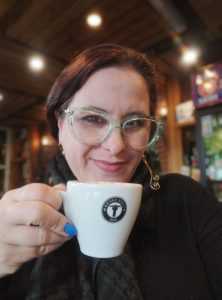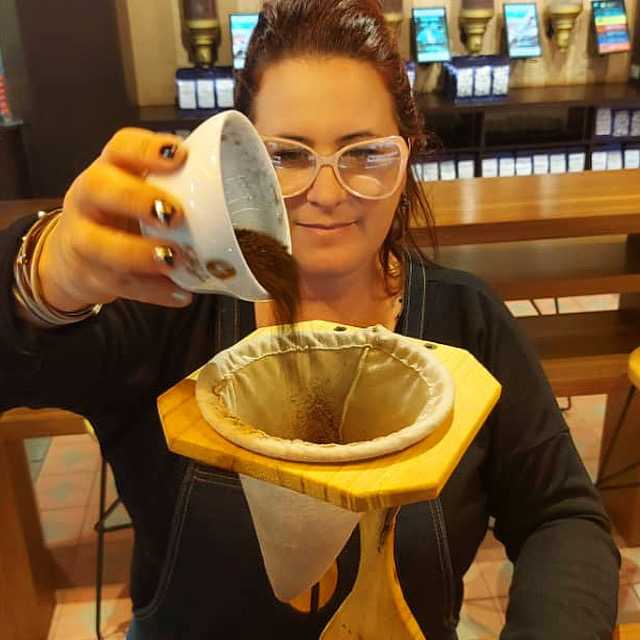MILAN – Today we meet Jannina Pojan, founder and director for about 7 years of the Venezuelan Coffee School, and also founder, about 4 years ago, of the Escuela del Café (EsCafé). She is the President of the Venezuela chapter of the International Women’s Coffee Alliance (IWCA Global). In addition to training coffee enthusiasts and professionals, she is dedicated to advising coffee shops.
She has a background of professional studies in gastronomy, administration, SCA international certifications, cocktails and is also a cigar and wine sommelier. And that’s not all: she has experience as a judge at barista championships in Colombia and Venezuela, and she creates a radio program dedicated to coffee
Pojan, you sign yourlsef on social media as ‘Thecoffeeteacher’, what does this mean?
“I have dedicated myself to the education of baristas and coffee specialists since 2011. During some of this activities, one of the students baptized me as “the coffeeteacher” and from that moment on, everyone who knows me in the world of coffee calls me that.”

Pojan, in 12 years of experience as a barista trainer and promoter of coffee culture, how have you seen the sector change? Has there been an evolution?
“Definitely there has been and there is still now, from my point of view and I always mention it, coffee is a world in constant evolution, that is why it is very important not to stop studying it.
The change and evolution has not only been in the behavior of the baristas, but also in the preparation methods, whether at home or in the coffee shops, and what has surprised and pleased me the most is in the field, the coffee growers are increasingly willing to new practices and trends in their processes, before, during and after the harvest. Likewise, the consumer is always more willing to try new experiences in each cup of coffee, he also prepares and studies to enhance these experiences.”
You have also founded and directed for about 7 years the Venezuelan School of Coffee and for the last 3 years also the School of Coffee (EsCafè): how is training, especially in the countries of origin, structured and how important is it for a fairer future of the sector?
“The globalization of the coffee sector and the pandemic led me to this change and definitely to the internationalization of the school and my personal brand. For me, during the pandemic, I discovered a great opportunity for professional and personal growth.
Working educating in the area of coffee in a producer and consumer country represents many challenges, it is very important to connect students with our history, how coffee came to Venezuela, the relevance it had in our independence, and, of course, highlight that We were the second producing and exporting country in the not too distant past.
That is why, in addition, we focus on highlighting that we can all contribute our bit in recovering that seat of honor, which is why we include visits to origin in our courses to experience first-hand the hard work behind a cup of coffee. So I believe that our training program has evolved from just educating baristas to building coffee specialists, knowledgeable about all the links in the coffee chain, and understanding that they are all equally important.”
How is the situation for women in Venezuela? In coffee, from your point of view, Pojan, as a ex-leader of the IWCA, what still needs to be done?
“In Venezuela, the woman, as in many other countries, is valuable, an important pillar of the home and of the source of work, since I began to visit farms I realized that when asking the foreman or owner of the farm, most of the times I would receveid as an answer “my wife knows that”. That’s when I realized the importance of women coffee growers and then I met the IWCA, for some time with a group of women, we are in the formation of the Venezuela chapter of the Alliance of Women in coffee from Venezuela. We have just begun the work of achieving gender equality and better conditions for all families dedicated to coffee in Venezuela.”
What is still missing to bring the ends of the supply chain together: farmer and consumer?
“Venezuelans are high consumers of coffee: for us, it is part of our daily lives, family and work gatherings. Proposals such as my school and the work I developed are a great opportunity for a link between the consumer and the producer. This year, in addition to the hand of the government company, we achieved the first edition of the International Meeting of Venezuelan Specialty Coffee that has made much more known and is committed to dignifying the work of the producer, and our emotionality has made this gap between consumer and producer be reduced much more.
A curiosity: how and how much coffee is drunk in Venezuela?
“Much! About 4 cups average per day. In the morning it can be in Italian or strained mocha, we call it guayoyo, in the office in an electric coffee maker and we love to visit cafeterias, where espresso (black for Venezuelans) or with milk or brown (Latte or cappuccino).”
And what’s your favourite?
“My favorite is a warm cappuccino with doppio ristretto, guayoyo, chemex and the Gabi.”
What are the future plans of Jannina Pojan, thecoffeeteacher?
“Continue promoting the culture of Venezuelan coffee in Venezuela and around the world, train more professionals and coffee enthusiasts, empower Venezuelan women throughout the coffee value chain through IWCA Venezuela, and of course, continue to develop as a coffee professional, learning while we enjoy the wonderful stories of coffee producers and consumers from Venezuela and the world.”
















